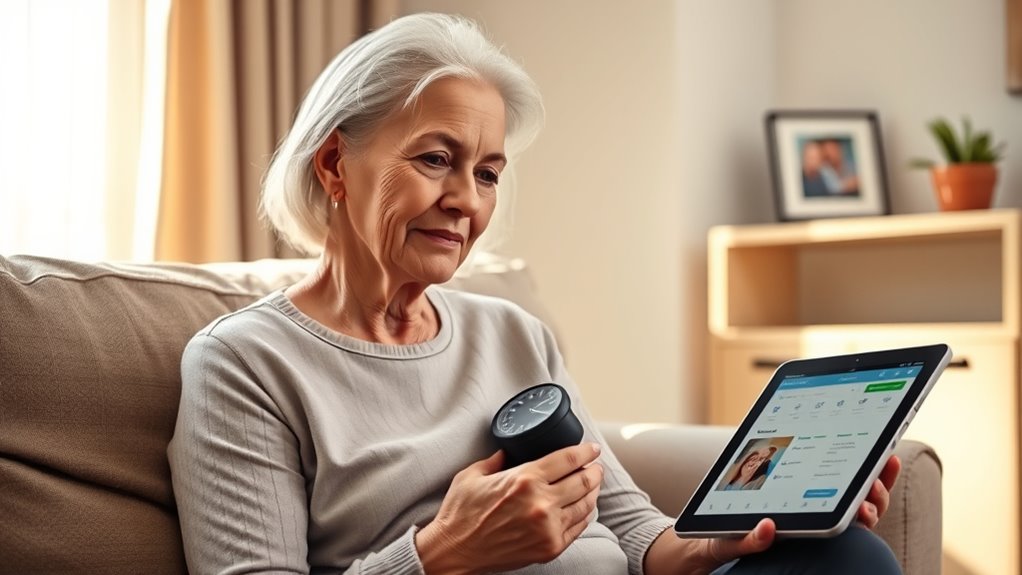To manage chronic conditions in the elderly, you should stay organized with medication schedules, use technology like reminders or remote monitoring, and follow healthcare advice closely. Regular check-ins, coordinated care, and healthy habits like proper diet and light exercise help prevent complications. Supporting caregivers and leveraging assistive devices can boost safety and independence. Focusing on all-encompassing strategies makes managing multiple health issues easier—there’s much more to discover if you keep exploring.
Key Takeaways
- Regularly review medications with healthcare providers to prevent adverse interactions and ensure proper management.
- Use digital tools like medication apps, timers, and remote monitoring for adherence and safety.
- Address caregiver challenges through support, training, and promoting self-care to sustain effective care.
- Promote healthy habits such as balanced nutrition, physical activity, and social engagement to support overall well-being.
- Implement coordinated, early intervention strategies to reduce complications, hospital visits, and healthcare costs.
Understanding Chronic Conditions in Older Adults

Understanding chronic conditions in older adults is essential because these illnesses are highly prevalent and can remarkably impact daily life. Over 95% of older adults live with at least one chronic condition, often managing two or more simultaneously. Conditions like diabetes, arthritis, and heart disease require ongoing management, regular health care, and continuous monitoring. To maintain independence and preserve quality of life, you need to adhere to medication schedules and adopt lifestyle changes. Effective management involves coordinated care among healthcare providers, ensuring treatments work together seamlessly. By focusing on medication adherence and ongoing monitoring, you reduce complications and hospital visits. Recognizing the importance of managing chronic conditions helps you stay healthier longer and enjoy an improved quality of life. Additionally, understanding trust issues and emotional well-being can play a crucial role in managing overall health. Incorporating self-care strategies such as regular exercise and proper nutrition can further enhance health outcomes for the elderly. Regular medical checkups and staying informed about available resources can also make a significant difference in managing these conditions effectively.
Common Chronic Diseases Affecting Seniors

What’re the most common chronic diseases impacting seniors? For older adults, chronic diseases like arthritis, osteoporosis, heart disease, hypertension, and diabetes are widespread. Nearly 95% of seniors have at least one, with many managing two or more conditions.
Most seniors live with at least one chronic condition, often managing multiple health issues simultaneously.
Arthritis and osteoporosis mainly affect bones and joints, leading to mobility challenges that can limit daily activities.
Heart disease and hypertension are leading causes of illness and death among seniors, emphasizing the importance of effective health management.
Recognizing these common chronic diseases helps you understand the challenges faced by older adults and highlights the need for strategies that support aging well.
Addressing these conditions early can improve quality of life and reduce healthcare costs, making managing chronic diseases essential for healthy aging.
An understanding of nutrients and their role in health](https://example.com/nutrients) is also vital for developing comprehensive management plans.
Strategies for Managing Multiple Health Issues

Managing multiple health issues can be challenging, but staying organized is key. You should coordinate with your healthcare providers and use tools like medication lists or apps to keep track of treatments and appointments. Additionally, maintaining a well-structured living space that accommodates mobility and safety can significantly reduce stress and prevent accidents related to chronic conditions. Incorporating home decor solutions such as wall organization systems and safety features can create a more accessible and calming environment for seniors. Utilizing assistive technology can also support independence and proper management of health conditions at home. Engaging in mindfulness practices like meditation can further improve emotional regulation and well-being in managing chronic health issues.
Medication Coordination Tips
To effectively coordinate multiple medications, it’s essential to regularly review and update your medication list, including OTC drugs and supplements. Proper medication management is crucial for elderly health, as it helps prevent harmful drug interactions and ensures safety. Schedule medication reviews with your healthcare provider and pharmacist annually to address any concerns or side effects. Use pill reminders or electronic timers to improve adherence, especially with complex dosing schedules. Maintain clear communication with your healthcare team about new symptoms or issues related to your medications. Keep medications in an accessible, designated area, and carry an updated list or emergency card. Additionally, digital literacy programs can support seniors in understanding and managing their medications more effectively. These steps promote safety, support effective management of chronic disease, and help you stay on top of your health.
Tech Tools for Management
Leveraging technology can considerably improve how you handle multiple health issues. Digital health tools like electronic pill timers boost medication adherence by providing visual and auditory reminders, reducing errors with complex regimens. Additionally, using performance tuning techniques tailored to individual needs can optimize your health management strategies for better outcomes. Incorporating digital records ensures your medical information is organized and accessible to healthcare providers, enhancing coordination of care.
Remote monitoring systems, including smart sensors, help with health management by detecting falls or unusual activity, giving you peace of mind. Emergency assistance devices with GPS, such as medical alert bracelets, ensure rapid help during emergencies.
Assistive devices like voice-activated speakers, such as Alexa or Echo, support independence by controlling lights, appliances, and reminding you to take medications. Virtual communication platforms like Zoom or FaceTime enable regular check-ins with caregivers, making chronic disease management easier.
Understanding the importance of contrast ratio in projectors can also enhance your viewing experience, as higher contrast ratios yield deeper blacks and brighter whites, making images more vivid and detailed. Knowing about air quality and using air purifiers can help reduce allergens and pollutants that may exacerbate health conditions, especially in urban environments.
These elder care technologies empower you to stay connected, safe, and in control of your health, promoting a mindful approach to managing your well-being.
The Role of Self-Management Programs in Aging

Have you ever wondered how older adults can better handle their chronic conditions? Self-management programs, like the CDC’s evidence-based initiatives, play a crucial role. These community-based programs focus on skill-building topics such as medication adherence, exercise, and nutrition, helping older adults manage symptoms like pain, fatigue, and depression. Incorporating community engagement can further enhance the effectiveness of these programs by fostering social support and shared experiences. Additionally, understanding the importance of emotional regulation can help participants develop coping strategies to better handle stress related to their health challenges. Many of these programs are designed to empower individuals through inspirational quotes that encourage resilience and a positive outlook, which can contribute to better health management.
Furthermore, understanding signs of spoilage in foods and beverages can help maintain proper nutrition and prevent health issues related to foodborne illnesses. Recognizing early foodborne illness symptoms allows for timely intervention and reduces complications. As a result, participants often experience improved health outcomes and greater independence. Engaging in these programs not only enhances quality of life but also reduces healthcare costs, saving an average of $714 per person annually.
Since 2006, over 400,000 individuals have benefited from such programs, demonstrating their widespread adoption and effectiveness in supporting aging populations. Self-management programs empower older adults to take control of their health and maintain their independence longer.
Utilizing Technology to Support Health and Independence

Building on the importance of self-management programs, technology offers practical tools that can further support your health and independence. Digital health tools like medication management apps and electronic pill timers help you stay on track and reduce errors. Home automation devices, such as voice-activated assistants and smart lighting, enable you to control your environment easily, promoting aging in place. Remote monitoring with cameras allows family to check in and offer support, while emergency alert devices with GPS ensure quick help during emergencies. These assistive technologies foster independence and safety. Additionally, the rise of breakfast delivery services demonstrates how technology can streamline daily routines and provide convenience, which can be adapted to support health management in the elderly. Plus, video calling platforms help maintain social connection, reducing loneliness and supporting mental well-being. Incorporating vetted devices and applications ensures reliability and effectiveness in managing your health. Using technology wisely can empower elderly individuals to maintain autonomy while ensuring their safety and well-being. Moreover, understanding health data privacy concerns is crucial to protect personal information while utilizing these digital tools.
Medication Management and Safety Tips

Managing your medications safely is essential for maintaining health and preventing complications. Effective medication management involves regularly reviewing your prescriptions with your healthcare provider and pharmacist to avoid adverse interactions.
Regularly review medications with your healthcare provider to ensure safety and prevent adverse interactions.
Keep an up-to-date list of all your medications, supplements, and vitamins in an easily accessible place.
Follow your prescribed dosages and timing exactly, using tools like electronic pill timers or medication management apps to stay on schedule.
Be alert to side effects or new symptoms, and report them promptly for necessary adjustments.
Incorporate safety tips such as wearing medical alert bracelets with GPS and leveraging technology like voice-activated assistants to support medication routines and emergency contacts.
Being aware of AI security vulnerabilities helps in understanding potential risks and ensuring your medication management tools are secure. These steps help ensure medication safety and better manage chronic conditions in the elderly.
Supporting Caregivers and Family Members

Supporting caregivers and family members is essential for ensuring effective care and the well-being of older adults with chronic conditions. Caregivers face many challenges, including physical exhaustion and emotional stress, which can affect the quality of care.
Providing support through respite care, support groups, and financial assistance helps reduce burnout and promotes emotional well-being. Proper training and access to community resources empower caregivers to manage chronic conditions effectively and navigate healthcare systems confidently.
It’s also crucial for caregivers to prioritize self-care, including adequate sleep, nutrition, and mental health. By addressing caregiving challenges proactively, you can sustain your ability to care and maintain your own health, ensuring both you and your loved one receive the support needed for better quality of life.
Promoting Overall Well-Being and Healthy Aging

Promoting overall well-being and healthy aging involves engaging in simple, consistent habits that enhance both physical and mental health. By managing chronic conditions effectively, you can improve your quality of life and maintain independence.
Prioritize self-care routines, such as healthy eating, regular activity, and health monitoring, to support healthy aging.
Staying socially connected through community activities or virtual interactions boosts emotional well-being and prevents loneliness.
Using technology like emergency alerts and home automation helps you stay engaged and independent longer.
Setting realistic health goals and building positive support systems foster long-term physical and mental resilience.
Frequently Asked Questions
What Are the Top 3 Chronic Conditions in Older Adults?
The top three chronic conditions in older adults are heart disease, diabetes, and arthritis. Heart disease leads to many deaths, affecting about a quarter of seniors.
Diabetes impacts roughly one in four adults over 65, causing issues like nerve damage.
Arthritis is the most common disability, making mobility difficult for over 50 million seniors.
Addressing these conditions with care and lifestyle changes helps you stay healthier and independent longer.
How to Manage Chronic Conditions?
To manage chronic conditions effectively, you need to stay proactive. Regularly monitor your symptoms, medications, and health changes, and share this info openly with your healthcare providers.
Follow your treatment plan closely, including medications and lifestyle tweaks.
Use helpful tools like health apps or reminders, and adopt healthy habits such as eating well, exercising, and managing stress.
This approach keeps you in control and supports better health outcomes.
What Are the 5 Lifestyle Behaviors to Reduce Chronic Disease?
Think of your health as a garden that needs regular tending. To reduce chronic disease, you should stay active with 150 minutes of exercise weekly.
Eat a diet rich in fruits and lean proteins.
Avoid smoking and limit alcohol.
Manage stress through relaxation techniques.
And get 7-9 hours of quality sleep.
These behaviors act like nourishing water and sunlight, helping your health flourish and stay resilient.
What Is the Hardest Chronic Illness to Live With?
You’re asking which chronic illness is hardest to live with. Many find diseases like Alzheimer’s, advanced heart failure, Parkinson’s, and multiple sclerosis particularly challenging because they affect daily function, cognition, and independence.
Chronic pain conditions like arthritis and fibromyalgia also take a toll, impacting mental health.
Ultimately, illnesses causing severe physical disability, cognitive decline, or loss of independence make life especially difficult, requiring ongoing adaptation and support.
Conclusion
By taking charge of your health, you can navigate chronic conditions like a seasoned sailor steering through rough waters. Embrace self-management, leverage technology, and lean on your support system to stay independent and active. Remember, you’re the captain of your well-being, and with the right tools and mindset, you can turn challenges into opportunities for a healthier, more vibrant life. Keep your eyes on the horizon—you’re capable of weathering any storm.









